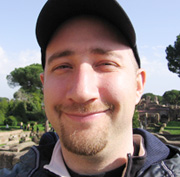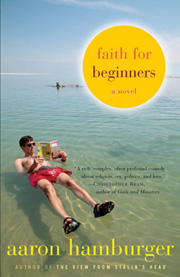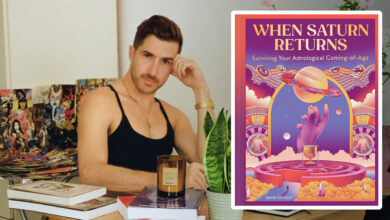‘Faith’ Restored
Gay writer Aaron Hamburger makes his novel debut with Faith for Beginners
By Gregg Shapiro

Faith For Beginners(Random House), the debut novel by gay writer and Rome Prize fellowship recipient Aaron Hamburger, tells the at turns humorous and heartbreaking story of the Michaelson family’s reparative journey to Israel in 2000. Focusing mainly on Helen, the mother of two gay sons and wife to an ailing husband, and Jeremy, the younger of the two sons, the author has created some of the most unforgettable characters in recent fiction. Through a series of unforeseeable circumstances and situations, Hamburger restores the readers’ faith in the bonds of family and, ultimately, in the power of love to heal wounds, old and new. He also deftly comments on the long combustible political situation in Israel without ever getting overly political or preachy, which is, in itself, a commendable feat.
Gregg Shapiro: Your first book, the short story collection The View From Stalin’s Head, was set in Prague and your new novel, Faith For Beginners, is set in Israel. What compels you to set your books in exotic locations?
Aaron Hamburger: Actually, I think my books are really about America, but just extensions of ourselves in other places. One thing you may notice if you travel a good deal is how the world’s culture is becoming increasingly similar, which is to say, increasingly American-influenced. I’m also interested in what happens to people when they’re removed from their daily lives and forced to confront a new culture. The modern wrinkle in this is now that there’s a whole tradition of travel literature and travel films where white Westerners go to dark Eastern places and lose their inhibitions or confront some inner demon, there’s an added expectation that on a trip to some exotic place you will have some transformative experience. The disjunction between the fantasy and the reality fascinates me. Finally, it’s a great excuse for me personally to travel. 
Was Faith For Beginners completed before or after the publication of The View From Stalin’s Head ?
Before. I actually thought I was finished with Stalin’s Head, but as it often happens, I wasn’t. In the meantime, I began working on Faith, and then went back and forth for a while.
Do you have a preference for the long or short form of fiction?
I think it’s much, much harder to write short stories. I don’t know how I did it before or whether I’ll be able to do it again. Writing a story collection is like writing 10 novels, but in miniature. A novel seems more daunting at first, but it allows you as the writer to really relax into your characters and setting and get to know them over time. Also, as you grow personally, the novel grows as well. I wasn’t the same person I was when I started the book and when I finished it. The novel changes accordingly.
How much of Aaron is in Jeremy and vice versa?
Very little of me is in Jeremy, and he was a difficult character for me to write. Jeremy, as you may remember, dabbles in all kinds of controlled substances and other pleasures. I’ve never even smoked a cigarette. I’ve never dyed my hair green or pierced myself with anything, certainly not a safety pin. But he was a pleasure for me to get to know because he’s so bold and puts himself forward. Also, as the novel went on, I enjoyed getting to know his vulnerable side.
What about in the case of his mother, Helen?
I was surprised by how much I related to her and how much of myself I’d invested in her. I think she is the hero of the novel, and so far readers seem to agree. I like her common-sense values. In some way I agree with her idea (lifted from E. M. Forster in Howards End, which she’s seen the film version of, though she can’t remember the source) that if the mothers of the world were to get together there would be no more wars. Then again, you look at some of the suicide bombers’ mothers, or the fanatical settlers in Gaza, and you wonder…
Why did you make the Michaelson family from Michigan?
Mainly because I’m from there, and it’s a place I know. I wanted the focus to be on Jerusalem, and if I’d made their hometown somewhere in the States I wasn’t already familiar with, it would have distracted me. In my new book too, the main characters are from Michigan, though an unusual neighborhood in Detroit where most of the residents are Communists.
Sex plays an important role in the book, and the two main characters, young gay man Jeremy and his mother Helen, appear to be equally concerned about the subject.
I actually think because we generally don’t like talking or hearing about sex in an honest frank way—we do talk about it, but we’re uncomfortable talking about it seriously—that any discussion of sex can seem to take an added precedence in our minds. But of course, sex is one of our great preoccupations. I also think a lot of the deepest part of our selves that we keep hidden comes out in sexual encounters, until a point. If we’re oversexed or addicted to sex, then it can become ritualistic. This is why sex is such a great opportunity for a novelist to show us his characters fully, and why I think contemporary fiction is absurdly under-sexed. In some books I’ve read, I feel as if I’m watching a 1940s black-and-white movie, which suddenly fades out at inappropriate moments. Or else we get the literary-porno version, in which the author shows us she’s not afraid to write frankly about the mechanics of sex. But what about the whole experience?
Faith For Beginners seems to dispel myths readers might have about certain types of people, such as gay men, middle-aged mothers, rabbis, political people, Israelis, and Arabs, among others. Was that your intention?
Not at all. I simply wanted to write a story, and to do that, you have to unfailingly humanist, and try as hard as you can to round out your characters. But I must confess, I am a radical egalitarian. I don’t believe there are any essential differences between those categories you mentioned, or even between men and women. We use the slightest differences between ourselves as identity markers for the convenience of shorthand, and then they take on increasing and dangerous significance. So if my book can work to elide those differences, all the better.
Faith For Beginners is set in the year 2000. What is the significance of that time setting?
Not for the numerical value of the year, but because it’s right before Israel and the Palestinians faced an important decision to go to war or make peace. I like putting my American tourists on the precipice of history, and watch them dance on the cliff’s edge, seemingly oblivious, until history catches up with them. I was in Israel during that summer, and it was a very interesting time. Everyone was talking about the war, even as Camp David was taking place, and there seemed to be no hope for peace. The pessimism was palpable. The heat, by the way, was so oppressive that even Israelis were complaining about it. That only added fuel to the flames.
Gay Jews are a subject that has been addressed recently in non-fiction settings such as the book Queer Jews and the documentary Trembling Before G-d. Please say something about writing about the topic in a fictional format.
I actually wanted to write a novel about the gay Jewish community of Israel, but as I said earlier, everyone there, when I went to do research, was interested in war. The gay community of Israel has a host of rights that we as Americans don’t have. It’s almost as if the Israelis say, Look, we have more important problems. Who cares about whether gays serve in the military? In terms of treating the topic fictionally, I don’t know, I just wanted to write a story, and I wanted to use this subject. I also thought it was an angle of Israel that hadn’t been explored much. One valuable thing about it is that as a gay person, you’re often exposed to people of different backgrounds than you would be otherwise. So it was a good way to introduce Jeremy to a gay, deaf Palestinian. How else would they meet if not in a cruising park?
Faith For Beginners is very cinematic. Are there plans for a movie adaptation, with say, Meryl Streep as Helen Michaelson?
Great idea. Do you know Meryl? Please whisper it in her ear. Actually, I always envisioned Emma Thompson.
Have you started work on your next book?
Yes. It’s a story of an American Jewish couple living in contemporary Berlin. They become involved with a mysterious Russian émigré who wants something from them, but they don’t know what it is.










